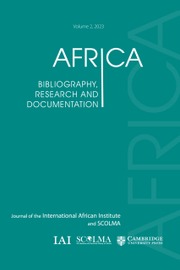Article contents
Empowering African languages through publishing: whose responsibility?
Published online by Cambridge University Press: 14 October 2022
Abstract
This article describes the work of the Jalada Translation Project in promoting translation into and between African languages through networking, social media, print and digital publishing and in confronting issues of orthography and editorial process. The terms of debate have changed and multilingual publication is becoming more commonplace. The author asks where responsibility lies for African language publishing and raises questions for government policy and African philanthropy.
Résumé
Cet article décrit le travail du Jalada Translation Project pour promouvoir la traduction en langues africaines et entre ces langues à travers le réseautage, les réseaux sociaux et l’édition imprimée et numérique, et pour s’attaquer aux problèmes d’orthographe et de processus éditorial. Les termes du débat ont changé et la publication multilingue se banalise. L’auteur demande à qui incombe la responsabilité de l’édition en langues africaines et soulève des questions pour la politique publique et la philanthropie africaine.
Information
- Type
- Article
- Information
- Copyright
- © The Author(s), 2022. Published by Cambridge University Press on behalf of the International African Institute
References
- 2
- Cited by

